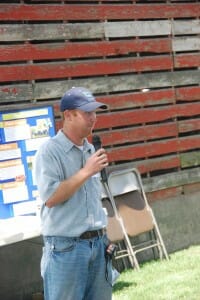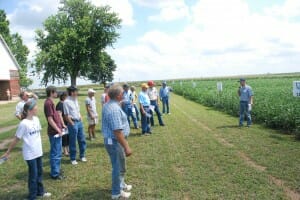Organic seed choice PFI Field Day with Tyler Franzenburg
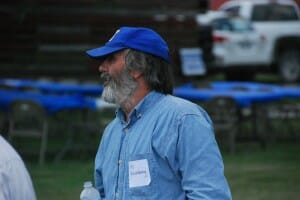 Tyler Franzenburg grew up helping his dad, Greg on this 80-acre diverse farm that has been in organic production since the late 1990s. As host of the field day, Tyler chose to showcase certified organic seed choices, rotational grazing, extended crop rotations (the method of natural fertility and pest control), and custom manure injecting equipment. 28 folks turned out to listen and learn. Not many farms are left in Iowa that are quite like the Franzenburg family of Keystone.
Tyler Franzenburg grew up helping his dad, Greg on this 80-acre diverse farm that has been in organic production since the late 1990s. As host of the field day, Tyler chose to showcase certified organic seed choices, rotational grazing, extended crop rotations (the method of natural fertility and pest control), and custom manure injecting equipment. 28 folks turned out to listen and learn. Not many farms are left in Iowa that are quite like the Franzenburg family of Keystone.
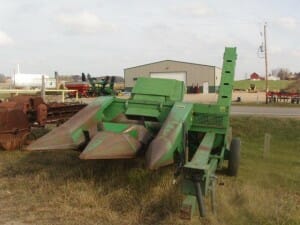 For one thing, they use a corn picker (at left) to take the ear corn out of the field in the fall and they store it whole, on the cob. About 20 acres of corn are grown in any one year splitting the balance of the land in hay, pasture, and soybeans. Stored in an air-dried wooden corn crib with big slats in it to let the wind keep the grain dry.
For one thing, they use a corn picker (at left) to take the ear corn out of the field in the fall and they store it whole, on the cob. About 20 acres of corn are grown in any one year splitting the balance of the land in hay, pasture, and soybeans. Stored in an air-dried wooden corn crib with big slats in it to let the wind keep the grain dry.
“We’ve always done fine without a combine, on an acreage like ours, there isn’t enough land to justify the expense of keeping one going” remarked Greg.
Then there is the challenge of grain storage.
“We also don’t have a grain dryer on the farm, so we use what we have 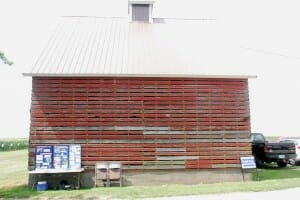 [the corn crib] and it works out alright,” assures Tyler.
[the corn crib] and it works out alright,” assures Tyler.
Several head of beef cattle that are rotated like clockwork around bountiful pasture mixed with half a dozen or more species of grasses, and legumes. Animals deposit their natural fertility as they walk around consuming the sun’s energy (stored by plants as cellulose) converting to sugars and protein in their rumen. The final act of the agricultural food chain is celebrated by beef lovers in every juicy bite of steak or hamburger.
While this farm is unique, a different system of crops and weed management than what the majority of Iowa’s rowcrop acres, what is the same is family, culture, and dreams of earning a full-time wage farming. Many of the Franzenberg clan were in attendance to show support for Tyler. Cousins, uncles, brothers, and family friends who don’t necessarily farm organically, but want to listen and visit with other farmers about farm or life concerns.
Tyler is about as modest as they come. Coupled with an astute business sense, agronomic knowledge second to none, creativity, and patience, he has many of the qualities necessary to be a sustainable farmer.
When prompted with the question about land base needed to farm full-time, Tyler responded, “I’d need about 200 acres to be able to earn a living farming with this organic crop and livestock model.”
But Tyler isn’t holding his breath for land access near his place. “There is too much competition among farmers for land, too much greed on all sides,” remarked one grazier in attendance.
At the moment, Tyler makes his living in the potentially dangerous business of manure management – pumping empty the 8 feet deep pits of manure that are underneath swine Confined Animal Feeding Operations (CAFOs) in the midwest.
“I consider what I do to be pretty hazardous, I mean, you can’t be in the buildings at all when we pump the pits, the gases can asphyxiate humans and pigs in seconds.”
For three months a year in the fall, Tyler works 14 hours a day pumping and injecting manure into rowcrop fields – a valuable fertilizer product for farmers.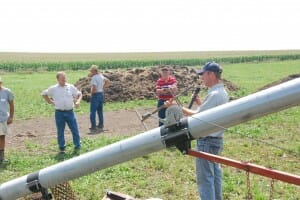 On hand was Tyler’s equipment that he uses to pump, and inject manure into fields. Af left, Tyler explains the importance of having two pumps to really agitate the pits well.
On hand was Tyler’s equipment that he uses to pump, and inject manure into fields. Af left, Tyler explains the importance of having two pumps to really agitate the pits well.
Tyler also demonstrates a keen sense of agronomy, acting as a certified crop advisor and a seed salesperson for Blue River Hybrids.
“We are here today to tell those attending and those reading about it afterwards, organic growers have options to buy organic seed, they are great yielding varieties too” emphasized Tyler.
Added PFI staffer Sarah Carlson, “If organic farmers fail to buy organic certified seed, this hurts them in the long run because they aren’t investing in breeding programs that select under organic conditions and therefore create more improved organic corn hybrids and soybean varieties for successful organic crop production.
Special thanks to Blue River Hybrids for sponsoring this field day. Also supported by the Beginning Farmer and Rancher Development Program of the National Institute of Food and Agriculture, USDA, Grant # 2010-49400-21843

